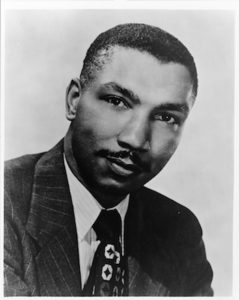
Robert L. Carter
*Robert Lee Carter was born on this date in 1917. He was a Black Attorney, United States District Judge, and activist.
From Caryville, Florida, while still very young, his mother moved north to Newark, New Jersey, where he was raised. Carter graduated from high school at sixteen and earned his undergraduate degree in political science from Lincoln University (Pennsylvania) and his law degree from Howard University School of Law in 1940, both on scholarship. He also was a member of the Alpha Phi Alpha fraternity.
Carter earned his LLM from Columbia Law School in 1941 after writing an influential master's thesis that would later define the NAACP's legal strategy on the right to freedom of association under the First Amendment to the United States Constitution. He then joined the United States Army Air Corps in 1944 upon completing his wartime service; he became an assistant special counsel at the NAACP’s Legal Defense and Educational Fund and, in 1948, became a legal assistant to Thurgood Marshall. Carter was a lead attorney on Sweatt v. Painter and presented part of the oral argument to the Supreme Court in Brown v. Board of Education. He also worked on many important civil rights cases, including Sipuel v. Board of Regents of Univ. of Okla. In 1956, Carter succeeded Thurgood Marshall as the general counsel of the NAACP.
Throughout his tenure, Carter argued or co-argued and won twenty-one of twenty-two cases in the United States Supreme Court. Among the most critical cases Carter worked on after Brown was NAACP v. Alabama (1958), in which the Supreme Court held that the NAACP could not be required to make its membership lists public. This removed a tool of intimidation employed by some southern states after Brown was decided and put into practice the insights into the First Amendment that Carter had gleaned when still a student at Columbia Law School.
In 1968, Carter resigned from the NAACP and his entire legal staff in protest of the firing of NAACP employee Lewis Steele for a critical article he published in the New York Times Magazine. In his autobiography, Carter writes that the NAACP board's decision to fire Steele over the article was aimed at him as "an effort to exert control over the general counsel's office and bring [Carter] in line."
Carter co-founded the National Conference of Black Lawyers (NCBL). He has served as a member of innumerable bar and court committees and has been associated with various educational institutions, organizations, and foundations. He has written extensively about discrimination in the United States, particularly school segregation, and of his longtime friends and colleagues, Thurgood Marshall and Charles Hamilton Houston.
On June 15, 1972, President Richard M. Nixon nominated Carter to a seat on the U.S. District Court, the United States District Court for the Southern District of New York, vacated by Thomas F. Croake. Carter was confirmed by the United States Senate on July 21, 1972, and received his commission on July 25, 1972. He assumed senior status on December 31, 1986, serving in that capacity until his death. In recognition of his civil rights achievements, Fordham University School of Law gave Carter an honorary Juris Doctor degree in 2004.
Also, in 2004, for the 50th anniversary of the Brown decision, the NAACP gave Carter the Spingarn Medal. Robert Lee Carter died of complications of a stroke on January 3, 2012.
Black History News Columbia.edu
The Crises Magazine,
Winter/2012 T
he Crises Publishing Company, Inc.